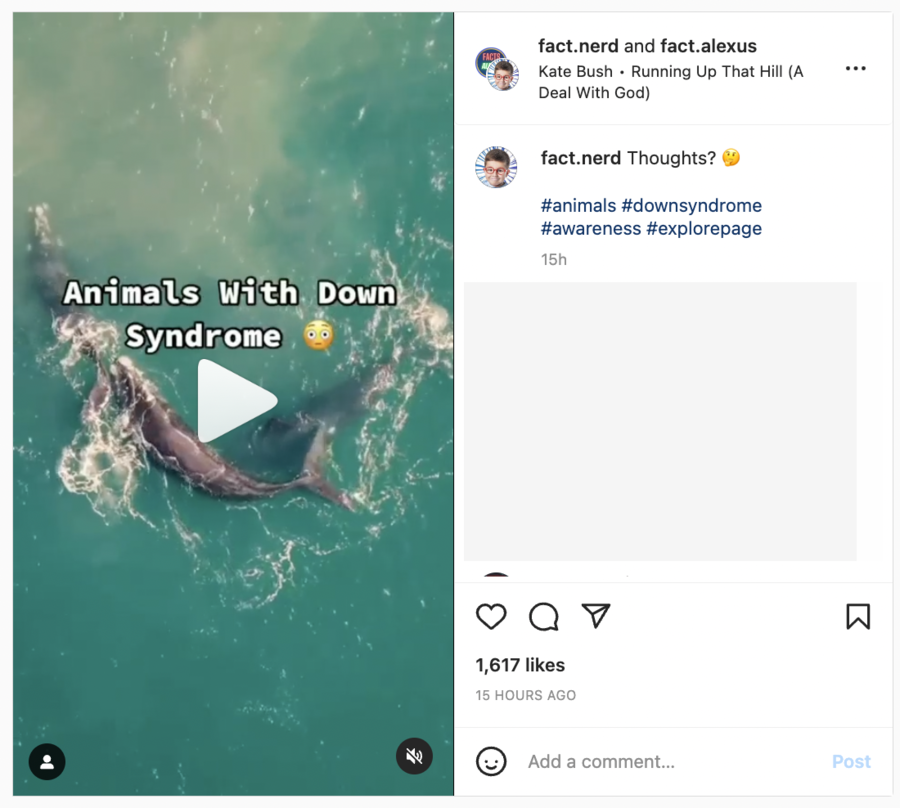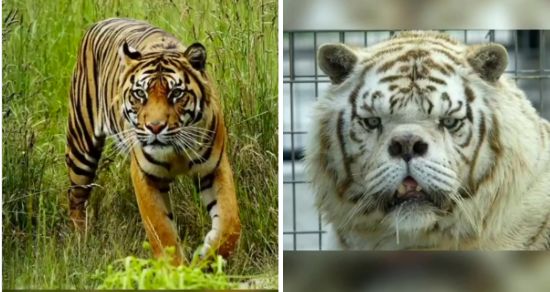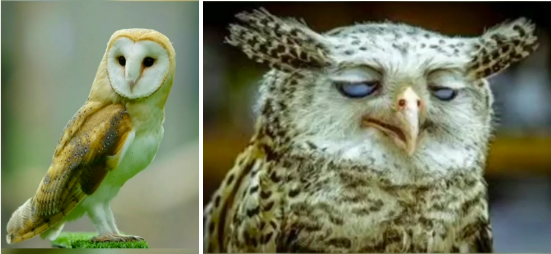STORY UPDATED: check for updates below.

Do animals aside from humans have Down syndrome? No, that's not true: Down syndrome is a genetic condition caused by a duplication of human chromosome 21, which is only found in humans, an expert told Lead Stories. Some animals, such as apes, may also have duplications of chromosomes specific to their species that may cause symptoms similar to those characterized by Down syndrome.
The claim originated in a video on Instagram on February 8, 2023, that claimed to show "Animals With Down Syndrome." The video slideshow then showed images of what were said to be a tiger and an owl with Down syndrome. Here is how the video appeared at the time of this writing:
(Source: Instagram screenshot taken Thurs Feb. 9 10:36:45 2023 UTC)
"Only humans can have a human disease," said Roger Reeves, a professor emeritus at the Johns Hopkins University School of Medicine Departments of Genetic Medicine and Physiology, in an email received on February 13, 2022.
What is Down syndrome?
Down syndrome is a genetic condition caused by an extra or partial copy of chromosome 21, which is specific to humans. Chromosomes are "threadlike structures" that carry genomic information and make up a part of DNA, writes the National Human Genome Research Institute. Down syndrome affects around 1 in every 700 human babies in the U.S. each year, notes the Centers for Disease Control and Prevention (CDC). Animals cannot be diagnosed with Down syndrome because they do not carry human chromosome 21.
Some animals -- including cats, calves and apes -- may have conditions similar to Down syndrome in which they have a duplicate or partial copy of a chromosome specific to their species, but that is not called Down syndrome.
What causes Down syndrome?
Each animal species has a certain number of chromosome pairs. Human cells, for example, have 23 pairs of chromosomes for a total of 46. Certain genetic conditions can arise when chromosomes duplicate incorrectly, as is the case with Down syndrome, which is caused during unusual and random cell division that results in physical features and developmental challenges, writes the Mayo Clinic. This is known as trisomy 21. Medical research has found Down is more common in children born to parents who have Down or other chromosomal disorders and when the birth mother is older than 35.
Other animal species have exhibited Down syndrome-like conditions
Genetic research in other species has shown that some animals may also exhibit chromosomal abnormalities that can cause developmental and physical conditions.
"Chimpanzees (our closest relative) have a chromosome that is nearly identical in gene content to HSA21. Three chimpanzees have been reported that were born with an extra copy of this chimpanzee equivalent of HSA21 and in fact, the effects on the craniofacial skeleton give them a distinct facial appearance reminiscent of that in people with trisomy 21," Reeves told Lead Stories.
Apes like chimpanzees, gorillas and orangutans are the only animal other than humans known to the scientific community to have a chromosome similar to human chromosome 21. Apes have 24 pairs of chromosomes for a total of 48 chromosomes. And those with a third copy of chromosome 22 can develop a chromosomal condition akin to Down syndrome, known as trisomy 22.
The first confirmed case of trisomy 22 was published in a 1969 issue of Science that described an "infant chimpanzee (Pan troglodytes) with clinical, behavioral, and cytogenetic features similar to those in Down's syndrome." In 2017, researchers in Japan confirmed in the peer-reviewed journal Primates a second case of a chimpanzee born with trisomy 22.
In 1999, researchers also described in the journal Acta Veterinaria Scandinavica a case report of a Hereford calf born with a case of trisomy 22.
Cats have 19 chromosomes, so while they can't have an extra chromosome 21 that causes Down syndrome, researchers in 1975 described in the American Journal of Veterinary Research a rare chromosomal abnormality in male cats for an extra chromosome that results in a condition similar to Klinefelter syndrome in humans, or when a boy is born with an extra copy of the X chromosome. This condition causes males to be tricolored or "calico" or "tortoise-shell," writes the pet nutrition company Hill's Pet.
Similarly, laboratory tests conducted with genetically engineered mice successfully overexpressed some mouse equivalents of HSA21 protein-coding genes. Some of these mice then exhibited "closely parallel effects on the craniofacial skeleton (which contributes substantially to the characteristic Down syndrome facial appearance)" as well as impaired learning and memory, added Reeves.
None of the animals shown in the post on Instagram were confirmed to have any "similar genetic basis to humans and/or an overexpression of the animal equivalents of HSA21 protein coding genes," said Reeves.
Debunking the slideshow photos: Tigers
(Source: Instagram screenshot taken Fri Feb. 10 19:51:20 2023 UTC)
The slideshow shared to Instagram compared a "normal" tiger with a white tiger implied to have Down syndrome. However, a reverse image search revealed that the white tiger featured on the right is a well-known feline named Kenny who was rescued from a breeding facility.
Cheryl King, marketing director for Turpentine Creek Wildlife Refuge in Arkansas told Lead Stories in an email of February 9, 2023, that Kenny was rescued by the refuge on October 3, 2000:
Turpentine Creek Wildlife Refuge did indeed rescue Kenny on October 3, 2000. Kenny was born in February 2019 in Bentonville, AR to a breeder but he was unsalable and unwanted due to his severe facial deformities. He had a pug nose and crooked teeth. While Kenny had physical deformities, he did not suffer any mental disabilities that we ever ascertained. His deformities were the result of inbreeding - his parents were siblings. Because the breeder could not find a buyer for Kenny, he lived in a small, dirty pen. Kenny enjoyed life in his grassy habitat here at Turpentine Creek Wildlife Refuge for 8 1/2 years until June of 2008 when he succumbed to malignant melanoma. Just like other white or lighter colored animals the white tigers are susceptible to melanoma.
King also referred our newsroom to a blog post from January 2018 that lists many of the deformities white tigers may exhibit as a result of inbreeding:
With only possibly two sources of white tiger blood in the U.S., that means all white tigers are extremely inbred. This inbreeding has lead to many genetic defects such as being cross-eyed, have shortened tendons of the forelegs (Clubfoot), kidney problems, higher rates of cancer, arched or crooked spines, twisted necks, snub/pug nose (like Kenny), cleft pallet, stunted growth, malformed jaws bones, deformed teeth, and many more birth defects. White tigers are extremely unhealthy and should never be bred.
Debunking the slideshow photos: Owl
(Source: Instagram screenshot taken Fri Feb. 10 19:53:16 2023 UTC)
The slideshow on Instagram also compared two photos of owls to suggest that the latter (right above) was an owl with Down syndrome. A reverse image search revealed that the owl on the left is a barn owl -- a different species than the bird on the right, which is most likely a great-horned owl. Though Lead Stories was unable to trace the original source of the photograph on the right, fact-checking website Snopes wrote in 2017 that it has been used in internet meme culture since at least 2014. There is no evidence to suggest that owls can have Down syndrome.
Updates:
-
2023-02-13T23:59:03Z 2023-02-13T23:59:03Z Adds comments from Roger Reeves, professor emeritus at the Johns Hopkins University School of Medicine Departments of Genetic Medicine and Physiology.




















